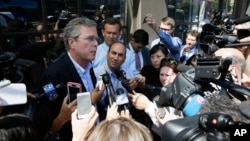Republican opposition to the Iran nuclear deal is likely to be front and center during the 2016 U.S. presidential campaign. Most of the Republican contenders wasted little time in slamming the deal, and it appears that the pact will be featured as the lead item in their critique of President Barack Obama’s foreign policy record.
The latest entrant into the Republican race, Wisconsin Governor Scott Walker, said that if elected he “would terminate the bad deal with Iran” on the first day of his presidency.
Former Florida Governor Jeb Bush said the deal was not diplomacy but “appeasement,” and New Jersey Governor Chris Christie agreed during a campaign stop in Maryland.
“As president, this type of appeasement of petty dictatorships like Iran and the theocracy they run and the terrorism that they support around the world will not be tolerated," Christie said.
Businessman Donald Trump, who has soared in the Republican polls based on his aggressive stand against illegal immigrants, said the Iranians are “laughing” at the U.S. after having made “an amazing deal.”
Democratic contenders supportive
The Iran deal is playing out much differently in the battle for the Democratic Party nomination. Obama has said he is eager to make the case in favor of the agreement, even among some Democrats who may be skeptical.
“Either the issue of Iran obtaining a nuclear weapon is resolved diplomatically through a negotiation, or it’s resolved through war. Those are the options,” Obama said at a recent news conference.
Front-runner Hillary Clinton said she supported the deal but was quick to add the need for “vigorous enforcement, unyielding verification and swift consequences for any violations.”
Clinton’s main challenger, Vermont Senator Bernie Sanders, called the deal “a victory for diplomacy over saber-rattling.”
Sanders is drawing big crowds including lots of progressives who remain driven by their opposition to the Iraq War launched by former President George W. Bush.
Public opinion polls leading up to the agreement showed the public more favorable than not to the idea of a deal but skeptical that Iran would abide by it.
Senate debate a preview
The first stage of the 2016 campaign debate over the Iran agreement will actually play out in the Senate when Congress begins its review of the deal. Four of the 15 announced Republican presidential candidates are senators: Ted Cruz of Texas, Lindsey Graham of South Carolina, Rand Paul of Kentucky and Marco Rubio of Florida.
Graham has staked his candidacy on his foreign policy and national security expertise and warned that the Iran deal as negotiated would be “a death sentence for Israel.”
But all four Republican senators who are running are sure to be in the spotlight once the congressional debate begins.
Election-year issues
The controversy over the Iran deal combined with growing concerns about international terrorism suggest foreign policy and national security issues could become dominant issues in next year’s campaign.
“I think it is always there,” said Karlyn Bowman, a public opinion analyst at the American Enterprise Institute in Washington.
“I think Americans are thinking — perhaps in the back of their minds, though perhaps not the first thing they think about in the morning — about the U.S. place in the world, about our military forces abroad and about a very dangerous world,” she said.
A recent George Washington University Battleground Poll found voters most concerned about the economy and the threat of terrorism. Republican Ed Goeas, who advises the Scott Walker campaign, oversees the Battleground Poll along with Democratic pollster Celinda Lake.
“I was surprised on the question we asked about terrorism," Goeas said. "We asked, 'Do you think anyone in your immediate family will be the target of a terrorist attack?'
And we basically had 39 percent [somewhat worried or very worried about the prospect] saying yes. The bigger thing we have seen is ISIS [Islamic State forces] and how they got the attention of the American public.”
But Democrat Lake is not convinced that the 2016 election will swing on foreign policy and national security. And if it does, she said, Clinton should be well-positioned to handle it.
“The question on the table may be, ‘Is this going to be a foreign policy election?’ And right now, the answer appears to be no," she said. "But things could change. People are worried about a terrorist attack, and I think it is very valuable for the Democrats that we have a candidate who clearly has security and foreign policy credentials.”














